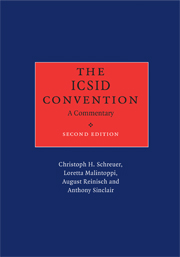Book contents
- Frontmatter
- Contents
- Foreword by Professor Sir Elihu Lauterpacht, CBE, QC
- Authors' preface to the second edition
- Table of cases
- List of abbreviations
- Text of the ICSID Convention
- Procedural calendar
- PREAMBLE
- CHAPTER I International Centre for Settlement of Investment Disputes
- CHAPTER II Jurisdiction of the Centre
- CHAPTER III Conciliation
- CHAPTER IV Arbitration
- CHAPTER V Replacement and Disqualification of Conciliators and Arbitrators
- CHAPTER VI Cost of Proceedings
- CHAPTER VII Place of Proceedings
- CHAPTER VIII Disputes between Contracting States
- CHAPTER IX Amendment
- CHAPTER X Final Provisions
- Article 67 Signature
- Article 68 Ratification and Entry into Force
- Article 69 Implementing Legislation
- Article 70 Territorial Application
- Article 71 Denunciation
- Article 72 Continuing Effect of Consent
- Article 73 Depositary
- Article 74 Registration
- Article 75 Notifications by Depositary
- Final Clause
- Consolidated bibliography
- Index by article
- Index by subject
Article 68 - Ratification and Entry into Force
from CHAPTER X - Final Provisions
Published online by Cambridge University Press: 07 September 2010
- Frontmatter
- Contents
- Foreword by Professor Sir Elihu Lauterpacht, CBE, QC
- Authors' preface to the second edition
- Table of cases
- List of abbreviations
- Text of the ICSID Convention
- Procedural calendar
- PREAMBLE
- CHAPTER I International Centre for Settlement of Investment Disputes
- CHAPTER II Jurisdiction of the Centre
- CHAPTER III Conciliation
- CHAPTER IV Arbitration
- CHAPTER V Replacement and Disqualification of Conciliators and Arbitrators
- CHAPTER VI Cost of Proceedings
- CHAPTER VII Place of Proceedings
- CHAPTER VIII Disputes between Contracting States
- CHAPTER IX Amendment
- CHAPTER X Final Provisions
- Article 67 Signature
- Article 68 Ratification and Entry into Force
- Article 69 Implementing Legislation
- Article 70 Territorial Application
- Article 71 Denunciation
- Article 72 Continuing Effect of Consent
- Article 73 Depositary
- Article 74 Registration
- Article 75 Notifications by Depositary
- Final Clause
- Consolidated bibliography
- Index by article
- Index by subject
Summary
Ratification, Acceptance or Approval
Art. 68(1) contains the common requirement that, in addition to signature, consent to be bound must be expressed separately. Only signatories may ratify, accept or approve the Convention (see Art. 67, para. 7). There is no substantive difference between ratification, acceptance and approval (History, Vol. II, pp. 442, 1000, 1019). In accordance with Art. 73, instruments of ratification, acceptance or approval are to be deposited with the World Bank. The World Bank, as depositary of the Convention, notifies all signatory States of such deposits in accordance with Art. 75(b).
The Report of the Executive Directors merely restates the contents of Art. 68:
46. … The Convention is subject to ratification, acceptance or approval by the signatory States in accordance with their constitutional procedures (Article 68). As already stated, the Convention will enter into force upon the deposit of the twentieth instrument of ratification, acceptance or approval.
Reservations
During the Convention's drafting, the issue of reservations was raised in a number of contexts (History, Vol. II, pp. 57/8, 59, 60, 66, 84, 283, 292, 442, 579). Mr. Broches pointed out that consent to jurisdiction was voluntary and that this fact should make most reservations unnecessary (at pp. 311, 362/3).
- Type
- Chapter
- Information
- The ICSID ConventionA Commentary, pp. 1269 - 1272Publisher: Cambridge University PressPrint publication year: 2009



